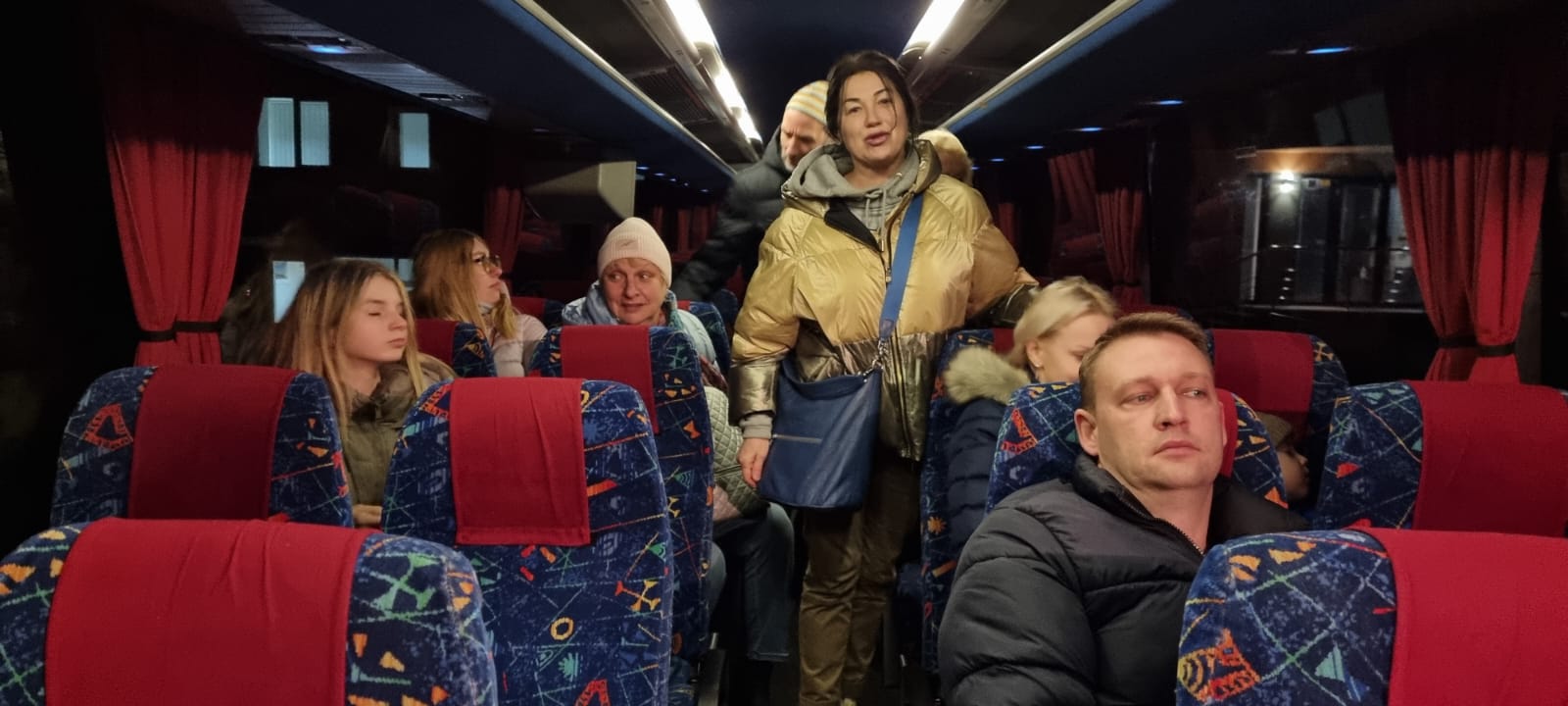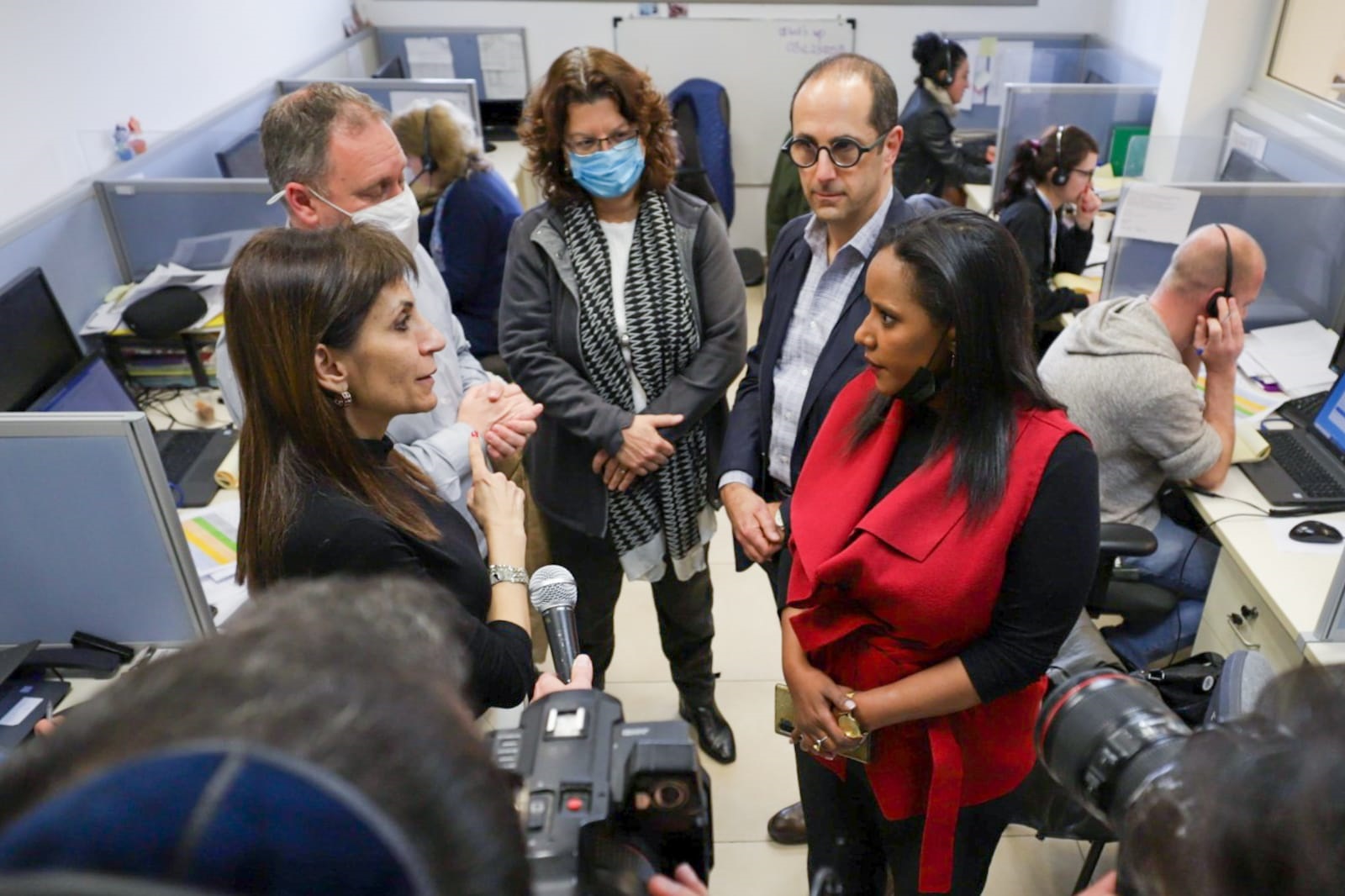An emergency hotline intended for Ukrainian Jews is being flooded with thousands of calls each day from people asking to move to Israel, the Jewish Agency for Israel (JAFI) has reported.
Roman Polonsky, JAFI’s regional director for Eastern Europe and Germany, told The Media Line that the call center had received 10,000 calls in just a few days, of which 5,000 were regarding immigration to Israel.
 [1]
[1]A staff member at the emergency hotline for Ukrainian Jews that is receiving thousands of calls a day. (Courtesy)
“To put it in proportion, last year we had 3,000 calls throughout the whole year and now, in only 72 hours, we’ve had about 5,000 calls with requests for aliyah,” Polonsky said, using the Hebrew word for immigration to Israel. “We’ve seen a huge surge and it will only get stronger and stronger, I’m sure.”
To cope with the rise in demand, the Jewish Agency has opened six immigration processing stations along the Ukrainian border in Poland, Romania, Hungary and Moldova. The stations are being run in cooperation with Nativ and Israel’s Foreign Ministry in order to provide immediate assistance to those who wish to move to Israel. There is also temporary housing in hotels in these countries.
An estimated 200,000 Ukrainians are eligible for Israeli citizenship under the Law of Return.
 [2]
[2]Jewish immigrants en route from Lviv to the border crossing with Poland. (Jewish Agency for Israel)
Aside from the ongoing Russian invasion, there are however important obstacles that are preventing many from immigrating. One of the biggest challenges, Polonsky noted, is the emergency regulation implemented by the Ukrainian government that prohibits male citizens aged 18-60 from leaving the country.
“They cannot go out and this means that families are often split,” Polonsky said. “Only women, small children and the elderly can [leave] and this is one of the big impediments. On the other hand, there is a surge of Ukrainians who want to fight the Russians and so I think that it’s kind of understandable that they have this regulation.”
Many attempting to flee the fighting are also finding it incredibly difficult to make it to the border and those who are fortunate enough to get there often come with little to no documentation.
Give the gift of hope
We practice what we preach:
accurate, fearless journalism. But we can't do it alone.
- On the ground in Gaza, Syria, Israel, Egypt, Pakistan, and more
- Our program trained more than 100 journalists
- Calling out fake news and reporting real facts
- On the ground in Gaza, Syria, Israel, Egypt, Pakistan, and more
- Our program trained more than 100 journalists
- Calling out fake news and reporting real facts
Join us.
Support The Media Line. Save democracy.
“Those who want to make aliyah to Israel have to get their visa from the Israeli Consul and in this situation, it’s not easy because people left their homes with two bags, a cat, and a dog, and weren’t prepared,” Polonsky said.
JAFI is working together with the International Fellowship of Christians and Jews (IFCJ), a philanthropic organization headquartered in the United States, to assist with flights to Israel, as well as the Aliyah and Integration Ministry, which will provide temporary housing to new Ukrainian immigrants in Israel.
Israel’s Aliyah and Integration Minister Pnina Tamano-Shata on Tuesday visited the emergency call center for Ukrainian Jews.
 [4]
[4]Israel’s Aliyah and Integration Minister Pnina Tamano-Shata on Tuesday visited the emergency call center for Ukrainian Jews. (Courtesy)
Due to the surge in requests, additional staff and volunteers will be made available in the coming days to answer calls.
“In this important hour of truth, we are constantly working to be accessible to Ukrainian Jews that are in great distress by expediting immigration requests and ensuring the coordination of all the necessary bodies, so that their destination will be obvious and accessible,” Tamano-Shata said in a statement that was shared with The Media Line.
Yael Eckstein, president and CEO of IFCJ, said that the organization had emissaries at nearly every border crossing from Ukraine in order to provide emergency assistance. But like Polonsky, she noted that many were stuck and finding it nearly impossible to reach the border.
“We can’t help them until they cross over the border,” Eckstein told The Media Line. “We have help inside of Ukraine for basic humanitarian needs.”
Because the situation on the ground is chaotic, it is impossible to foresee exactly what will be left of Ukraine’s Jewish community once the dust settles. Nevertheless, Eckstein believes that a wave of immigration is only just beginning.
“We see from the calls that there are thousands of people interested [in immigrating] and not taking that leap yet, but we believe that people inside Ukraine are in survival mode,” she related. “There are people waiting in lines for days to cross over the border, people that don’t have food and people that they had to leave behind to be able to escape themselves.”
Other Jewish organizations are focusing their assistance efforts on helping those in need inside Ukraine.
The Israeli first response organization, United Hatzalah, has deployed a team to provide humanitarian assistance in Moldova for refugees fleeing from Ukraine. The organization has also chartered an El Al Israel Airlines plane that will deliver humanitarian goods on Thursday. United Hatzalah further hopes that it will be able to fly a small number of Jewish refugees to Israel.
The American Jewish Joint Distribution Committee, also known as the Joint or the JDC, is currently aiding nearly 40,000 needy Jews in 1,000 locations across the country. With its network of 3,400 active volunteers, the JDC is providing medicine and other essentials.
“Currently, we’re engaged in emergency aid efforts to make sure that the Jews we take care of have everything that they need,” Michael Geller, director of media relations at the American Jewish JDC, told The Media Line. “Before the invasion began, we were very keen to prepare and made sure that people that we serve had enough food, medicine and essentials in case there was trouble for the long-term.”

